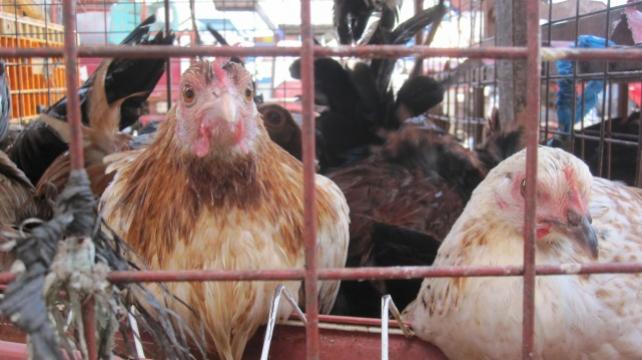'No change in Negros Occidental chicken sales'

The sale of live and dressed chicken inside public markets in Negros Occidental, particularly in Bacolod City, was already low even before the bird flu outbreak in San Luis town, Pampanga.
Jesusa Togle, live native chicken vendor in Libertad Public Market, said the demand for the commodity is normally low from the late part of May towards August.
Togle said most vendors now rely to some of their “suki” or regular buyers and not on individual consumers.
“Bird flu outbreak may just have triggered the lower consumption, but (this is) not absolutely the reason,” she said, adding that they expect sales to recover by next month during harvest and the start of milling season.
Aldrin Alibuga, dressed chicken vendor at Bacolod City Central Market, said they are now having a hard time selling their stocks as the demand is very low.
Alibuga also pointed out that poor sales is felt by the dressed chicken vendors prior to the bird flu outbreak.
“Whether there is a bird flu outbreak or not, lower consumption is really low especially in the month of August,” he said, adding that if Negros is also infected "we would possibly suffer much."
The vendors said there was no movement on the prices of dressed and live chicken since the first week of the month.
The average price of live native chicken remains at P200 to P250 per head depending on the size and weight while dressed chicken currently costs P145 per kilogram.
On Sunday, the Department of Agriculture (DA) banned fowl shipment from Luzon to other parts of the country, including Negros Occidental, amid the outbreak in the province of Pampanga.
Provincial Veterinarian Renante Decena said that low consumption is expected especially during the outbreak since most people are not aware that the animal disease is only confined within a municipality in Luzon.
“Negrenses should remember that Negros is not Pampanga, and that there is nothing to worry about,” he said.
The provincial veterinarian also pointed out that the recent reduction on price of dressed chicken in the province is not attributed to the bird flu outbreak.
Last week’s prevailing market price monitoring of the Provincial Veterinary Office (PVO) showed that average price of dressed chicken is P157.15 per kilogram. The figure is P1.63 lower than the previous P158.79 per kilo.
“This is mainly because of intra-provincial movement of the commodity, we have yet to wait for the new price monitoring next week,” Decena said.
In a press conference on Monday, Agriculture Secretary Emmanuel Piñol said about 25,000 fowls have already been culled since Sunday.
Piñol said Assistant Secretary Enrico Garzon yesterday issued Memorandum Circle No. 9 series of 2017 amending the previous order imposing a temporary ban on the movement of live, domestic and wild birds and their by-products including poultry meat, day-old chicks, eggs, semen, and manure from Luzon to Visayas and Mindanao.
“Since Visayas and Mindanao are still bird flu free, the movement of the products from there to Luzon is allowed,” Piñol said, adding that Luzon to Luzon movement may be allowed provided this is outside the seven-kilometer radius controlled area of Pampanga and subject to various conditions.
In Negros Occidental, the PVO had earlier allayed fears that the viral infection among fowls won't affect local stocks.
Decena reiterated that Philippines is archipelagic and many animal checkpoints are being conducted as quarantine procedures thus, it is unlikely for the virus to easily enter the province.
Decena also said the province is not sourcing out chicken from Pampanga or any part of Luzon because the province has adequate supply.
The PVO records showed that the province has an average production of seven million heads of backyard native chicken including gamefowl and free-range every month.
In terms of broiler or white chicken, Negros Occidental has an average monthly production of 1.5 to two million heads.
The figures are more than the province’s average daily consumption requirement of only 55.32 metric tons for native and dressed chicken, it added.
“Our structure and staff are capable of preventing the entry of bird flu. However, necessary precautionary measures should still be implemented,” Decena said.
He added that the province is deficit in eggs thus, "we will make sure that supply coming from affected areas in Luzon should not enter Negros Occidental." — BAP, GMA News

Need a wellness break? Sign up for The Boost!
Stay up-to-date with the latest health and wellness reads.
Please enter a valid email address
Your email is safe with us






